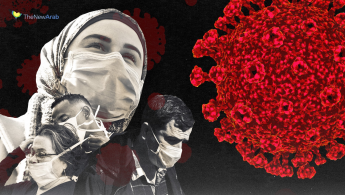The Middle East at war with coronavirus: Top stories from 25 April
1. Fears raised in Iran of 'fresh outbreak' of virus
Iranian health officials on Saturday raised fears of a "fresh outbreak" of coronavirus cases in their country, which has paid the deadliest price in the Middle East from the pandemic.
As the predominantly Shia country marked the start of the Islamic holy month of Ramadan, a day later than much of the Muslim world, another 76 fatalities were declared, raising Iran's official death toll to 5,650.
Iran has in phases since April 11 allowed the reopening of a number of businesses that were closed as part of measures to curb Covid-19.
The spread of the disease has slowed since the start of April, but Alireza Zali, the anti-coronavirus coordinator for the capital, on Saturday criticized "hasty reopenings".
They could "create new waves of sickness in Tehran and complicate efforts to bring the epidemic under control", he said, quoted by the official news agency IRNA. Read more here.
 |
| Click to enlarge |
2. Abu Dhabi's Etihad extends suspension of flights
Abu Dhabi's Etihad airways said in a statement on Saturday it would extend its suspension of scheduled passenger flights until May 15.
The airline had said it would partially resume passenger flights from May 1.
Etihad and other UAE airlines have been operating outbound-only flights for foreigners wishing to leave the Gulf Arab state, which has banned the entry of foreigners due to the global coronavirus outbreak.
"This decision is being taken early to avoid potential disruption to customers wishing to travel during that period, and for their safety and wellbeing," the airline said in an email to Reuters.
The coronavirus outbreak has virtually halted all international air travel. Read more here.
3. Turkey's steps to support economy over Covid-19 reach $29 bln
The Turkish government's steps to support the economy in the face of the coronavirus pandemic have reached a value of 200 billion lira ($28.7 billion), Finance Minister Berat Albayrak said on Saturday.
Twitter Post
|
President Tayyip Erdogan initially announced a 100 billion lira package to support the economy on March 18, postponing debt payments and reducing tax burdens in some sectors. Since then, Ankara has gradually widened such measures.
With the pandemic forcing businesses to furlough or lay off millions of staff, the government has also stepped in to top up income or pay daily stipends, while small businesses are being given access to fresh loans.
"The total value of the steps we have taken so far has reached 200 billion lira," Albayrak said in a video posted on his Twitter account.
Turkey's confirmed cases of Covid-19 increased by 3,122 on Friday with the death toll rising to 2,600.
4. Hundreds test positive for coronavirus in Morocco prison
The General Delegation for Prison Administration and Rehabilitation said that 207 prisoners and 62 staff in the facility in southern Morocco had tested positive for the virus, while another 55 inmates were waiting for the results of their tests.
Authorities had decided to test all the prison's inmates and staff on Wednesday after several people had tested positive. Read more here.
5. Tunisia hopes novel methods will aid virus fight





 Follow the Middle East's top stories in English at The New Arab on Google News
Follow the Middle East's top stories in English at The New Arab on Google News
![Israeli forces ordered bombed Gaza's Jabalia, ordering residents to leave [Getty]](/sites/default/files/styles/image_330x185/public/2176418030.jpeg?h=a5f2f23a&itok=_YGZaP1z)

